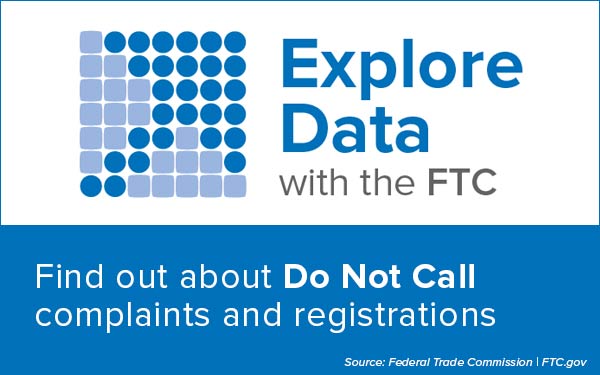Continuing its rigorous enforcement of the nation’s telemarketing and robocall laws, the Federal Trade Commission over the past year expanded its efforts to stop illegal calls originating overseas from entering the United States, working in coordination with its sister agency, the Federal Communications Commission (FCC).
 To stop these illegal overseas calls, the FTC announced in April 2023 that it had implemented Project Point of No Entry (PoNE), targeting “point of entry” or “gateway” Voice over Internet Protocol (VoIP) service providers and warning they must work to keep illegal robocalls out of the country. The project’s work has continued over the past year and continues to demonstrate its effectiveness by targeting more than two dozen service providers that were involved in millions of illegal robocall campaigns.
To stop these illegal overseas calls, the FTC announced in April 2023 that it had implemented Project Point of No Entry (PoNE), targeting “point of entry” or “gateway” Voice over Internet Protocol (VoIP) service providers and warning they must work to keep illegal robocalls out of the country. The project’s work has continued over the past year and continues to demonstrate its effectiveness by targeting more than two dozen service providers that were involved in millions of illegal robocall campaigns.
“Illegal robocalls are a scourge that waste Americans’ time and defraud them of money. VoIP providers knowingly enable these scammers, allowing robocalls to proliferate on a massive scale,” said FTC Chair Lina M. Khan. “The FTC will continue to crack down on upstream actors that facilitate fraud, and we’ll keep working with the FCC to protect Americans in the fight against illegal telemarketing.”
“Coordination among federal partners is key when cutting off the scourge of illegal robocalls from abroad,” said FCC Chairwoman Jessica Rosenworcel. “These results of our recent actions are clear: together we are stronger in our efforts to protect American consumers from fraudulent and harassing international robocallers.”
Through Project PoNE, the FTC is disrupting foreign-based scammers and imposters responsible for blasting U.S. consumers with annoying and unwanted calls. As part of the project, the Commission: 1) identifies point of entry VoIP service providers that are routing or transmitting illegal call traffic from overseas, 2) demands they stop doing so and warns their conduct may violate the Telemarketing Sales Rule, and then 3) monitors them to pursue recalcitrant providers, including by opening law enforcement investigations and filing lawsuits when appropriate.
Through the FTC’s enforcement efforts and its collaboration with partners such as the Industry Traceback Group (ITG), FCC, and state attorneys general, Project PoNE uncovered 24 target point of entry VoIP service providers responsible for routing and transmitting illegal robocalls between 2021 and 2023, in connection with approximately 307 telemarketing campaigns.
According to ITG, a single campaign often represents hundreds of thousands or millions of calls, and a traceback represents a snapshot of any given campaign. After being contacted by Project PoNE staff, ITG traceback data showed that 22 of the 24 targets significantly curbed or altogether stopped the flow of illegal robocalls through their networks, as evidenced by the decrease in the combined tracebacks from 1,043 last year to 306 this year, a decrease of over 70 percent.
During the most recent effort, the FTC issued cease and desist letters to seven more targets. These VoIP providers were identified as the point of entry for illegal robocalls entering the U.S. and were involved in a total of 452 tracebacks.
The targets were involved in about 154 illegal robocall campaigns, including government and business impersonator scams, utility disconnection scams, and student loan and credit card debt relief schemes, among others. Some of the other campaigns targeted Chinese-speaking communities in the U.S. by blasting illegal robocalls in Chinese, with scammers misrepresenting their affiliation with the “Chinese Consulate,” with a well-known package delivery company, or a major telephone service provider.
For the most recent round of letters, the FTC coordinated with the FCC, which issued separate letters to the same targets. Last year, the FCC issued an order against a VoIP service provider, which also was a target of Project PoNE. The combined efforts of both agencies make the message clearer to these VoIP service providers that they need to be more vigilant gatekeepers of the U.S. telephone lines, especially against illegal robocalls coming from overseas.
As part of its commitment to protect every community, the FTC has provided consumer tips on How to Avoid a Scam, including those that use illegal robocalls, in English, in Traditional Chinese and Simplified Chinese, and several other languages.
The FTC’s East Central Region is spearheading Project PoNE. Consumers who want to report concerns regarding any of the voice service providers that received letters from Project PoNE staff can do so by going online to ReportFraud.FTC.gov or calling (877) FTC-HELP.
The Federal Trade Commission works to promote competition and protect and educate consumers. The FTC will never demand money, make threats, tell you to transfer money, or promise you a prize. Learn more about consumer topics at consumer.ftc.gov, or report fraud, scams, and bad business practices at ReportFraud.ftc.gov. Follow the FTC on social media, read consumer alerts and the business blog, and sign up to get the latest FTC news and alerts.
